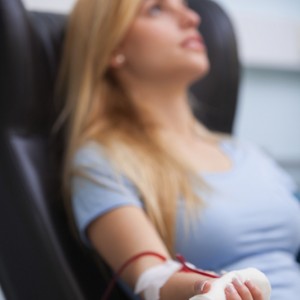Clinical Trial is Testing Stem Cells in Scleroderma

 Richard Burt, MD, of Northwestern University is looking to harness the power of autologous, patient-derived stem cells for the treatment of systemic sclerosis. His previous work in a clinical trial with scleroderma motivated a new phase 3 clinical trial, entitled “Autologous Stem Cell Systemic Sclerosis Immune Suppression Trial (DIScl2011).” The trial is currently recruiting up to 160 patients, with a goal of completing the trial by September 2018.
Richard Burt, MD, of Northwestern University is looking to harness the power of autologous, patient-derived stem cells for the treatment of systemic sclerosis. His previous work in a clinical trial with scleroderma motivated a new phase 3 clinical trial, entitled “Autologous Stem Cell Systemic Sclerosis Immune Suppression Trial (DIScl2011).” The trial is currently recruiting up to 160 patients, with a goal of completing the trial by September 2018.
According to Dr. Burt, the same team’s previous trial, “ASSIST I, was the first randomized trial in patients with scleroderma to not just slow disease progression but rather actually reverse it.” Positive benefits in ASSIST I were improvements in the lung parameters of forced vital capacity (FVC) and total lung capacity (TLC), improvements in patient quality of life, and improvements in high-resolution computed tomography images.
To add to these excellent preliminary data, the researchers are altering the conditions of the original trial. During ASSIST I, patients were given a conditioning regimen of cyclophosphamide and rabbit-derived anti-thymocyte globulin (rATG), which are two anti-inflammatory drugs. In the current trial, patients will be given a lower dose of cyclophosphamide to protect the heart and a dose of fludarabine, which is a chemotherapeutic. Both groups will be treated concurrently with hematopoietic stem cell transplant. Since both groups will receive cells, the only tested variables are a lower dose of cyclophosphamide combined with fludarabine treatment.
This treatment regimen uses cyclophosphamide to mobilize patients’ peripheral blood stem cells. A few days after mobilization, cells will be collected and preserved until re-infusion into the patient.
The primary outcome is to determine treatment failure within 12 months. Researchers will consider treatment a failure if patient skin score does not increase, patient FVC deteriorates by 10%, patients experience kidney failure, or patients develop gastrointestinal failure as a result of systemic sclerosis. As a secondary measure, patient survival will be followed for up to five years past the start of treatment.
“This study will determine if the less cardiotoxic regimen will be safer than the standard regimen and as effective as the standard regimen,” stated the researchers. If just as effective, this new treatment regimen would prove extremely valuable to patients with systemic sclerosis, as they would benefit from a more-safe approach to reversing their symptoms.






